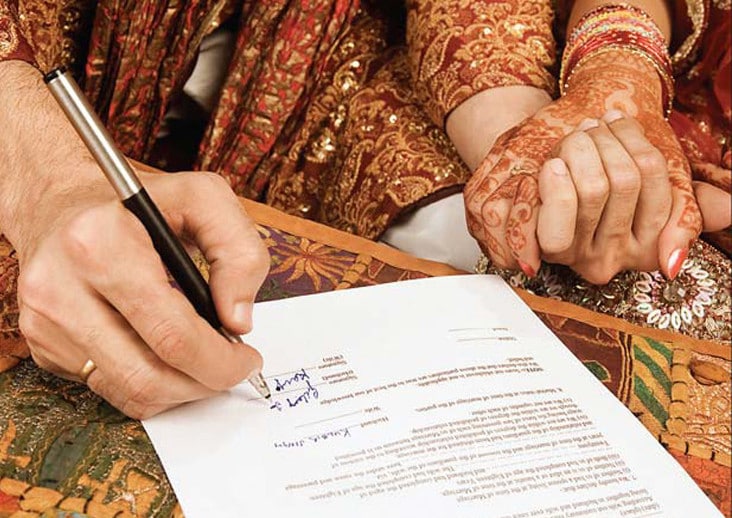Court marriage is a formal union between a man and a woman, solemnized in front of a Magistrate or Nikah Registrar, in which they become life partners.
When one or both parties to the marriage are unable to gain their parents’ approval or are concerned that they will not be allowed to marry, court marriage is entered into.
In this case, the Nikahnama (Marriage Contract) is recorded and issued by the locality’s Nikah Registrar, not by the court. So keep in mind that no court issues marriage certificates; instead, the Nikah Registrar registers and issues the Marriage Certificate, also known as the Urdu Nikahnama.
A court marriage entails a few basic processes for people who can’t afford to spend hundreds of thousands of rupees on wedding festivities.
Also, be aware that in Pakistani law, the term “Court Marriage” is not defined in any Act, Ordinance, Rule(s), or Schedule(s). The court recognizes and ratifies such marriages, which are solemnized with the assistance of a lawyer.
The Muslim Family Laws Ordinance 1961 in West Pakistan makes it plain that anyone can marry the opposite sex at his or her opposite sex. The courts in Pakistan are obligated to protect the marital rights of people who must be adults who have already married or who wish to marry within the law.
In Pakistan, the court marriage procedure is as follows:
Pakistan’s constitution guarantees the freedom to marry whoever one wishes. In Pakistan, the court marriage procedure is quite straightforward. The interested couple must meet the following requirements:
According to Islam, the age of marriage is the age of puberty. And, according to the law, the age of marriage is equal to the age of the majority, which is 18 years old.
In Pakistan, marriage is always performed with the opposite sex. Marriage between lesbians or homosexuals is illegal in Pakistan.
In Pakistan, marriage documents are required by the court.
- In the event that the marriage pair does not have a valid NIC or passport, they must present a Matriculation certificate or Form ‘B’.
- If one of the partners is a foreigner, a passport must be presented.
- There should be two witnesses at the wedding.
- 4 + 4 passport size images for the bride and groom.
- Affidavit of free will from the bride
- Valid Divorce Certificate or Death Certificate of the deceased husband in the case of a second marriage by the bride.
- Valid approval from the first wife or the Arbitration Council in the case of a groom’s second marriage.
We process the Nikahnama for registration after the wedding / civil marriage. The Union Council also issues NADRA Marriage Certificates. In addition, we provide translation services in languages such as Arabic, English, Dutch, Spanish, German, Italian, Hindi, and Pilipino.
You may contact us to obtain our services for an online civil marriage by calling us and speaking with us in confidence. At no time do we share any of your personal information with anyone. We keep the information about our clients’ records private. You can rely on our skills to assist you in the most efficient manner possible. We also provide legal assistance for internet marriages in Pakistan and around the world. We offer the best legal assistance at a reasonable cost.
In Pakistan, there are no specified court marriage fees. Your costs are determined by the skills and knowledge required of a seasoned lawyer, as well as your current location and the postal address to which you wish to submit your marriage documents after registration. The marriage certificate issued by the court after this procedure is significant evidence of the marriage.
In Pakistan, the following laws govern the solemnization and registration of marriages:
- Muslim Family Laws Ordinance, 1964
- Rules under Muslim Family Laws Ordinance, 1965
- Child Marriage Restraint Act, 1929
- Child Marriage Restraint (Punjab Amendment) Ordinance, 1971
- The Azad Jammu and Kashmir Family Courts Act, 1993
- Births, Deaths and Marriages Registration Act, 1886
- Christian Marriage Act, 1872
- Conciliation Courts (West Pakistan Amendment) Act, 1969
- Foreign Marriage Act, 1903
- Hindu Marriage Disabilities Removal Act, 1946
- Hindu Married Women’s Right to Separate Residence and Maintenance Act, 1946
- Hindu Widows’ Remarriage Act, 1856
- The Hindu Marriage Act, 2017
For a consultation, please contact us on this number (042) 37237003







Leave A Comment